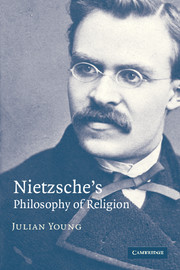Book contents
- Frontmatter
- Contents
- Acknowledgements
- List of abbreviations
- Introduction
- 1 Schopenhauer and ‘Man's Need for Metaphysics’
- 2 The Birth of Tragedy
- 3 Untimely Meditations
- 4 Human, All-too-Human
- 5 The Gay Science
- 6 Thus Spoke Zarathustra
- 7 Beyond Good and Evil
- 8 On the Genealogy of Morals
- 9 The Wagner Case
- 10 Twilight of the Idols
- 11 The Antichrist
- 12 Ecce Homo
- 13 Epilogue: Nietzsche in history
- Bibliography
- Index
Introduction
Published online by Cambridge University Press: 27 October 2009
- Frontmatter
- Contents
- Acknowledgements
- List of abbreviations
- Introduction
- 1 Schopenhauer and ‘Man's Need for Metaphysics’
- 2 The Birth of Tragedy
- 3 Untimely Meditations
- 4 Human, All-too-Human
- 5 The Gay Science
- 6 Thus Spoke Zarathustra
- 7 Beyond Good and Evil
- 8 On the Genealogy of Morals
- 9 The Wagner Case
- 10 Twilight of the Idols
- 11 The Antichrist
- 12 Ecce Homo
- 13 Epilogue: Nietzsche in history
- Bibliography
- Index
Summary
In his first book, The Birth of Tragedy (1872), Nietzsche presents the tragic art of fourth-century Greece as a religious festival which gathered the community together as community in the presence of its divinities. And he further argues that without a religion which both unites a culture and provides answers to the fundamental existential questions faced by all individuals, society decays. So, he concludes, the hope for a redemption of modernity from the decadence – the dis-integration – into which it has fallen, lies in the rebirth of Greek tragedy promised by Richard Wagner's projected Bayreuth Festival.
Two features distinguish this early thinking. First, it is communitarian thinking in the sense that the highest object of its concern is the flourishing of the community as a whole. And second, it is religious thinking in that it holds that without a festive, communal religion, a community – or, as Nietzsche frequently calls it, a ‘people’ – cannot flourish, indeed cannot properly be said to be a community.
This book originated in the question: what happened to this early religious communitarianism in Nietzsche's later works? What happened to Nietzsche's ‘Wagnerianism’?
In 1876 two people departed, as if in panic, midway through the first Bayreuth Festival. One was poor, ‘mad’ King Ludwig, Wagner's patron, and the other was Friedrich Nietzsche. After his flight, Nietzsche turned from being Wagner's ardent disciple to being his most virulent critic. But what was it that he rejected?
- Type
- Chapter
- Information
- Nietzsche's Philosophy of Religion , pp. 1 - 7Publisher: Cambridge University PressPrint publication year: 2006



